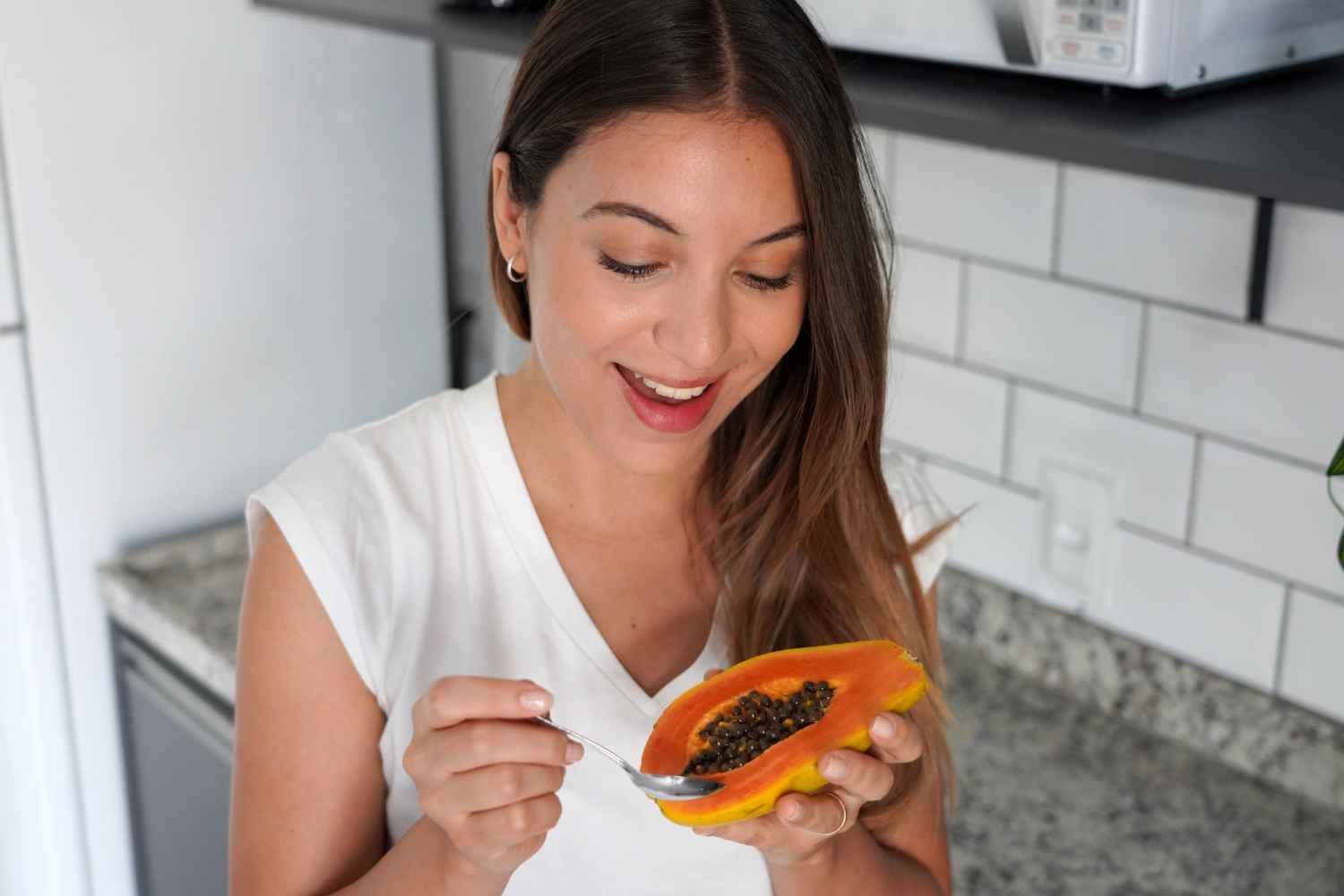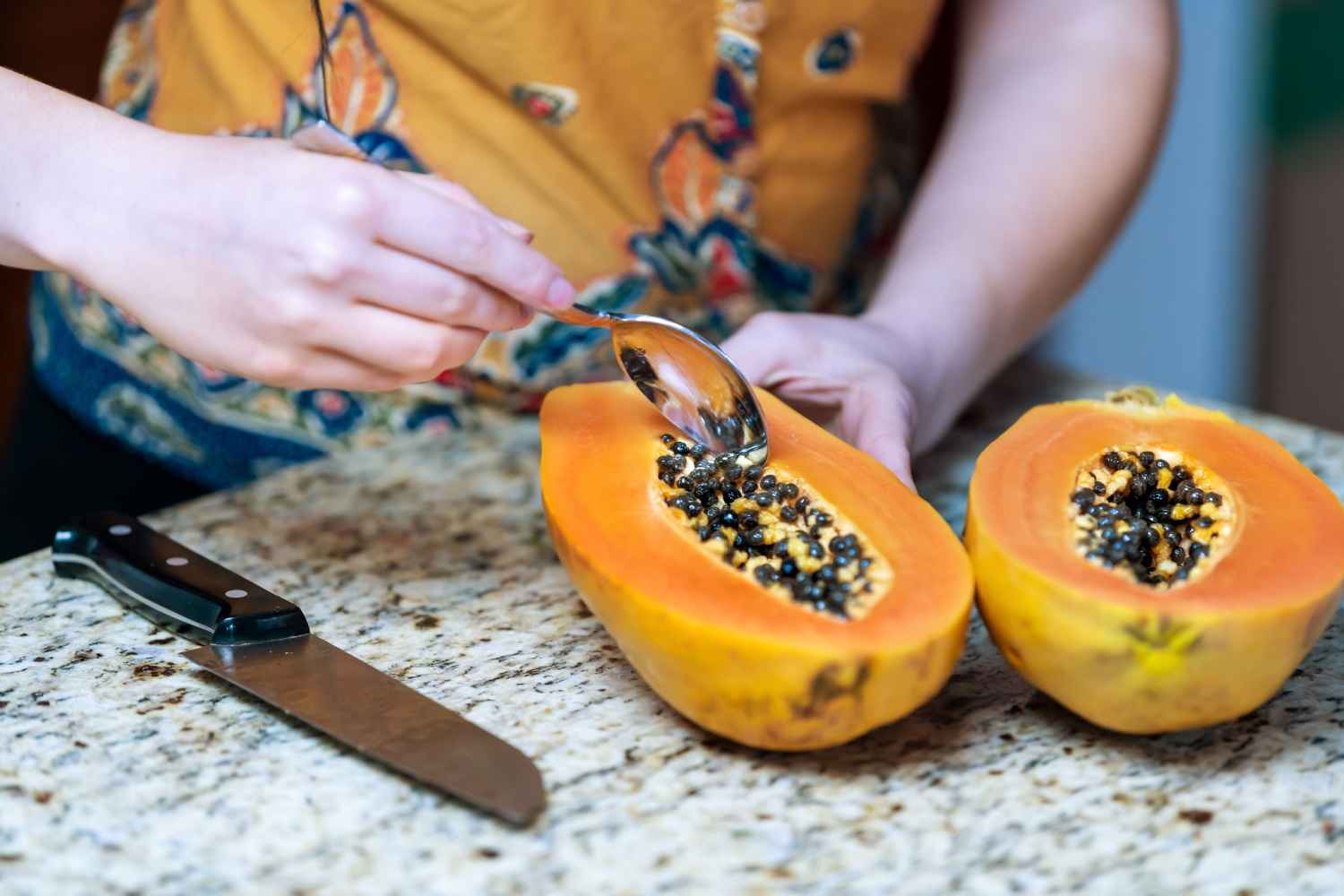
Are you a new mother worried about your baby getting enough milk? You are curious about how to maintain a diet that would result in sufficient milk production. Are you? Are you concerned that your favorite foods may have an impact on your baby’s health through breast milk? No wonder those thoughts grip your mind as your baby is surviving on your breast milk alone. The essence of many foods you eat can indeed get into breast milk and influence the health of the baby. This article discusses whether eating papaya during breastfeeding has benefits associated with it for a safe breastfeeding journey.
Are you a papaya fan concerned about its safety during breastfeeding? Are you avoiding it because you believe it would harm your baby’s health? You may have previously heard that eating papaya during pregnancy is not a good idea. While there is a belief that papaya can cause abortions, its medical properties have been known for centuries (1). But what about during breastfeeding? This article digs into the safety of eating papaya at this time, offering you useful information and answers.
In This Article
- Is It Safe To Eat Papaya During Breastfeeding?
- What Are The Benefits of Eating Papaya During The Lactation Period?
- Nutritional Value of Papaya
- Is Cooked Papaya Equally Beneficial as Uncooked One?
- Green Papaya or Ripe Papaya, Which is More Beneficial During Breastfeeding?
- How Can I Have Papaya During Breastfeeding?
- When to Avoid Papaya During Breastfeeding?
- What Causes Papaya Allergy?
- What are the Warning Signs of Papaya Allergy?
- FAQ’s
Is it Safe to Eat Papaya During Breastfeeding?
Yes, it is safe to eat papaya while breastfeeding, provided the mother has no allergy to it. Also, moderate consumption is recommended as overconsumption of anything during the lactating period can harm the mother and the little one.
What Are The Benefits of Eating Papaya During The Lactation Period?

Incorporating papaya into a lactating mother’s diet can benefit her health and breastfeeding experience.
- Improves breast milk production: Papaya contains nutrients such as vitamins A, C, and E, which can increase milk supply during lactation.
- Digestive aid: Papaya contains papain, an enzyme that aids digestion. The high dietary fiber and water content help to treat constipation, which is common in the postpartum period.
- Rich in antioxidants: Papayas contain antioxidants, lycopene, and choline, which serve to minimize oxidative stress and inflammation in the body.
- Immune system support: Papayas’ strong vitamin C content boosts immune function.
- Improves cardiovascular health: This yellow-orange fruit comprises antihypertensive, hypoglycemic, and hypolipidemic properties that can aid in the prevention and treatment of obesity and related metabolic disorders (2,3).
- Boosts beta-carotene and vitamin A levels: Papaya also has alpha and beta-carotene, lutein, and zeaxanthin, which aid in boosting beta-carotene and vitamin A levels in breastfeeding mothers.
Raw papaya is approved as a galactagogue (inducing lactation) across Asia. This is because green papaya increases the production of a hormone – oxytocin – in the mother’s body which is the hormone that regulates milk production.
- Two proteolytic enzymes papain and chymopapain are found in papaya (Carica papaya) fruit before it ripens, but not in mature fruit (4). Many people enjoy unripe papaya fruit in salads or prepared as a vegetable.
Nutritional Value of Papaya
Papaya pulp contains vitamins A, C, and E, B complex vitamins including pantothenic acid and folate, minerals like magnesium and potassium, and dietary fibers, supporting the mother’s nutritional needs (5). It is also a low-calorie food with just 43 calories per 100 g bowl of papaya and hence keeps a check on your calorie intake (6).
| Nutrients | Value |
| Calories | 43 kcal |
| Protein | 0.47 g |
| Fat | 0.26 g |
| Carbohydrates | 10.8 g |
| Dietary fiber | 1.7 g |
| Total sugar | 11 g |
| Vitamin C | 60.9 mg |
| Vitamin A | 47 mcg |
| Beta carotene | 274 mcg |
| Lycopene | 1830 mcg |
| Sodium | 8 mg |
| Potassium | 182 mg |
| Folate | 37 mcg |
Is Cooked Papaya Equally Beneficial as Uncooked One?
Yes, papaya is safe to consume both raw and cooked. Green papaya contains enzymes such as papain, which help digestion by breaking down food proteins. According to studies, raw papaya, whether cooked or uncooked, is equally healthful. However, it is usually preferable to cook raw papaya before consumption. Later in the article, we covered how you can consume raw papaya during breastfeeding
Green Papaya or Ripe Papaya, Which is More Beneficial During Breastfeeding?

Incorporating raw green papaya into meals or using ripe yellow-orange papaya has several health benefits during breastfeeding. Raw papaya, in particular, packs a punch with its concentrated enzymes and nutrients, making it a medical superfood. Ripe papaya, whether mixed with vegetables or eaten alone, is a tasty and nutritious addition to the breastfeeding diet.
How Can I Have Papaya During Breastfeeding?
Because of its bland taste, green papaya can be made interesting by adding some ingredients, and thus it makes for a great snacking option.
Here are a few options:
- Slice papaya, remove the peel and seeds, and eat with a bit of lemon.
- Prepare a salad with lime juice and hot peppers and enjoy a bowlful.
- You may even make green papaya curry, a traditional South Asian delicacy.
- Serve it stir-fried or in a green papaya stew. It will not only help you produce more breast milk but will also satiate those untimely hunger pangs.
- Don’t be afraid to make tasty lemonades, tangy salsa dressings, spicy dips, sweet and spicy sauces, chilled soups, and/or protein smoothies loaded with nutrients and antioxidants.
- Eat papaya in moderation to avoid any possible adverse effects.
- Choose fully ripe papayas, as they are easier to stomach.
When to Avoid Papaya During Breastfeeding?

While papaya offers many nutritional benefits for breastfeeding, it should be avoided if a family member is allergic or if you have papaya allergies. Prioritize safety and seek help from a healthcare professional. Keeping your loved one’s health in mind will result in a comfortable breastfeeding experience.
What Causes Papaya Allergy?
The skin and fruit of papaya contain an enzyme almost identical to latex. This enzyme is accountable for the allergic reaction of papaya. This enzyme is mistaken for an allergen by the body which tries to dispose of it by making a particular antibody called IgE. The reaction of the antibody causes an allergic reaction which varies from mild to severe from person to person.
What are the Warning Signs of Papaya Allergy?

Look for these warning signs of papaya allergy, avoid eating it, and seek medical help.
- Itchy rashes and redness on the skin when the skin touches the latex of the papaya.
- Chest congestion and breathing trouble.
- Burning sensation along with the Inflammation of the oral cavity, mouth, and lips (oral allergic symptom) while eating papaya.
- Diarrhea and vomiting.
- The most severe allergic reaction is falling unconscious.
Now, there is no wonder papaya is called the “fruit of angels”, considering its benefits. Go ahead and include it in your postpartum diet. Other than producing more breast milk it will also help you to heal faster from the injuries from your delivery. But make sure to consult with your doctor first about this.
Are There Any Precautions to Take When Eating Papaya During Breastfeeding?

The ripened papaya fruit pulp is a popular snack. Here are a few precautions to take when eating papaya during breastfeeding:
- Moderation is the key when eating papaya. A dish of papaya or three thin slices will provide your body with vital nutrients.
- Excessive papaya eating may result in nausea, vomiting, flatulence, and loose motions.
- Avoid using papaya leaf extract tablets/capsules during the lactation phase.
- Unripe papaya fruit includes papaya latex, which contains an enzyme known as papain. Taking excessive doses of papain may harm the esophagus. It may also cause allergies like swelling, dizziness, headache, rashes, skin irritation, and blistering, thus hypersensitive nursing mothers should seek medical advice before using it.
FAQ’s
1. Can Eating Papaya During Breastfeeding Increases Body Heat?
Papaya is a heat-inducing fruit. So, eat them in moderation. Overconsumption can increase body heat, which is not healthy.
2. Will Papaya Increase Lactation?
Papaya is rich in oxytocin. This is the hormone responsible for regulating milk production. Green papaya can increase the milk supply.
3. Can the Benefit of Eating Papaya While Breastfeeding Reach the Baby?
Oh yes! Papaya is rich in many vitamins. These can be passed to the baby.
4. Will Papaya Help With Constipation?
Papaya improves bowel movements. Eating it in moderation can help with constipation. Some people can experience diarrhea too.
Reference
- Traditional food taboos and practices during pregnancy, postpartum recovery, and infant care of Zulu women in northern KwaZulu-Natal – [https://pubmed.ncbi.nlm.nih.gov/33743760/]
- Papaya’s milky texture packed with nutrients – [https://www.heart.org/en/news/2023/10/13/papayas-milky-texture-packed-with-nutrients]
- Nutraceutical Potential of Carica papaya in Metabolic Syndrome – [https://www.ncbi.nlm.nih.gov/pmc/articles/PMC6682863/]
- Papaya – [https://pubmed.ncbi.nlm.nih.gov/30000941/]
- Nutraceutical Potential of Carica papaya in Metabolic Syndrome – [https://pubmed.ncbi.nlm.nih.gov/31315213/]
- Papayas, raw – [https://fdc.nal.usda.gov/food-details/169926/nutrients]

